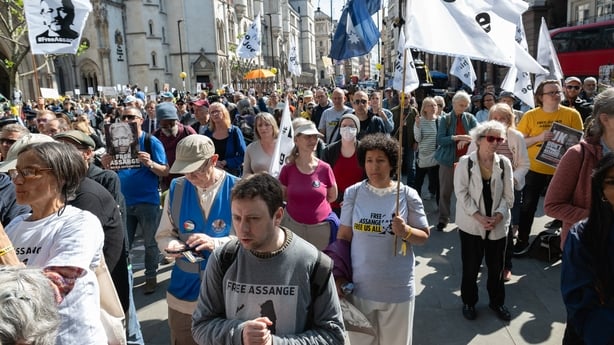WikiLeaks' founder Julian Assange's battle to avoid extradition to the US has received a huge boost after London's High Court ruled that US assurances over his case were unsatisfactory and he would get a full appeal hearing.
In March, the High Court provisionally gave Mr Assange, 52, permission to appeal on three grounds.
But it gave the US the opportunity to provide satisfactory assurances that it would not seek the death penalty and would allow him to seek to rely on a First Amendment right to free speech in a trial.
In a short ruling, two senior judges said the US submissions were not sufficient and said they would allow the appeal to go ahead.
Mr Assange's lawyers have accepted an assurance that the US will not seek the death penalty if the WikiLeaks founder is extradited and convicted, the High Court has heard.
Mr Assange faces prosecution in the US over an alleged conspiracy to obtain and disclose national defence information following the publication of hundreds of thousands of leaked documents relating to the Afghanistan and Iraq wars.
We need your consent to load this rte-player contentWe use rte-player to manage extra content that can set cookies on your device and collect data about your activity. Please review their details and accept them to load the content.Manage Preferences
During a two-day hearing in February, lawyers for the 52-year-old asked for the go-ahead to challenge a previous judge's dismissal of his case to prevent his extradition.
Last month, Judge Victoria Sharp and Mr Justice Johnson dismissed most of Mr Assange's legal arguments but said that unless "satisfactory" assurances were given by the US he would be able to bring an appeal on three grounds.
These assurances are that Mr Assange would be protected by and allowed to rely on the First Amendment - which protects freedom of speech in the US - that he is not "prejudiced at trial" because of his nationality, and that the death penalty is not imposed.
At a hearing this morning, the High Court heard that the US authorities had provided assurances to the court, with the promise not to impose the death penalty accepted by Mr Assange's lawyers.
Mr Assange was not present at the hearing in London, with his barrister Edward Fitzgerald KC telling the court that "for health reasons, he has decided not" to attend.

Lawyers on behalf of the US said Mr Assange's bid to bring an appeal should be refused given the promises provided in a note from the US embassy in London.
One of the assurances reads: "The United States is able to provide such assurance as Assange is not charged with a death-penalty eligible offence, and the United States assures that he will not be tried for a death-eligible offence."
The note also states that Mr Assange will be able to raise and "seek to rely upon" protections under the First Amendment, and that he will not be prejudiced because of his nationality.
James Lewis KC, for the US, said in written submissions that there is "no question" that Mr Assange, if extradited "will be entitled to the full panoply of due process trial rights, including the right to raise, and seek to rely upon, the first amendment as a defence".
In response to the assurances, Mr Assange's wife Stella Assange previously said the US had provided "blatant weasel words".
Mr Fitzgerald said most of the promises were "blatantly inadequate" but that they had accepted the promise about the death penalty.
In written submissions, the barrister said that while the assurance over the death penalty was "an unambiguous Executive promise", the other assurance does not give "any reliable promise as to future action".
The barrister added in written submissions: "What needs to be conclusively removed is the risk that he will be prevented from relying on the first amendment on grounds of nationality."
Mr Fitzgerald continued: "The problems with the assurance in this case, which seeks to avoid the consequences of that case law, are multi-fold."
Dozens of Mr Assange's supporters gathered outside the Royal Courts of Justice in London ahead of the hearing, with many holding banners and signs.
Members of the 52-year-old's family, including Mrs Assange and his father, attended the hearing.
In a January 2021 ruling, then-district judge Vanessa Baraitser said that Mr Assange should not be sent to the US, citing a real and "oppressive" risk of suicide, while ruling against him on all other issues.
Later that year, US authorities won their High Court bid to overturn this block, paving the way towards Mr Assange's extradition.
Additional reporting from PA

